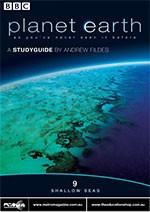Product Overview
Planet Earth is a BBC production with five episodes in the first series (episodes one through five) and six episodes in the second series (episodes six through eleven). Each episode examines a specific environment, focussing on key species or relationships in each habitat; the challenges they face; the behaviours they exhibit and the adaptations that enable them to survive. Recent advances in photography are used to achieve some spectacular 'first sights' – in particular, stabilised aerial photography gives us remarkable views of migrating animals and the techniques used by their predators to hunt them.
As the series examines pristine environments where possible, they are often extreme. These are the parts of the world where few humans have chosen to live as the climate and landscape is too challenging, too difficult and dangerous. The plants and animals that do survive here have made some spectacular adaptations in forms and behaviour to live in these far reaches of the planet.
The series is suitable for middle secondary students studying Science and SOSE, and for senior secondary students of Biology, Environmental Science and Geography.
No, penguins don't tap dance. But what they really do is much more amazing!
Episode six, the first episode of the second series, examines the two poles of Planet Earth, the frigid zones of the far north and south. The north and south poles are very different systems, sharing little more than a climate. Antarctica is a giant continent crushed beneath the weight of ice kilometres thick while the Arctic is the exact opposite, an ocean crusted with a jumbled, slowly moving ice pack trapped between the frozen cliffs of the northern lands that ring it. A crust of ice which may disappear during our lifetimes, changing this fragile ecosystem forever.
For now, the poles share a type of ecosystem brilliantly adapted to survive the two polar seasons, the thaw of the summer when the sun never sets and the freeze of winter with its endless dark. There are magnificent stories of survival here but also small tragedies for the death of one creature is usually new life to another. Nature has little interest in happy endings.
It also raises questions of the changes of those ecosystems with global warming. In particular the plight of the polar bear which can no longer rely on roaming across the sea ice in spring after its long hibernation to break its long fast with a nice, fat seal pup. The ice shelf melts earlier now, making that first, crucial hunt almost impossible. We see the bears swimming further and further from shore in the newly exposed stretches of water or attempting impossible and suicidal attacks on elephant seal herds in their desperate need for food.







